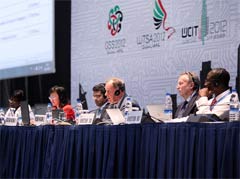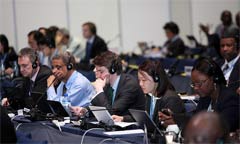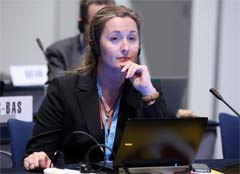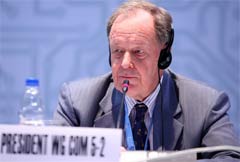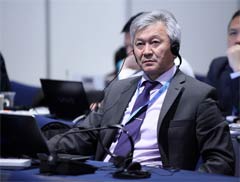


|
WCIT-12 News:
|
Week two begins in earnestThe PlenaryRecognized operating agencies versus operating agenciesA compromise proposal on the “Use of the terms recognized operating agencies/operating agencies is now on the table, following lengthy negotiations that took place in in the Ad hoc Group of the plenary on Monday morning (10 December). Reporting to the plenary on the negotiations, the Chairman of the Conference explained that the compromise proposal is to use a footnote to clarify OA when referenced in a text. But other groups still prefer ROA. In the end, discussion was deferred until Tuesday’s plenary. Energy efficiency and e-wasteA new provision has been approved on “Energy Efficiency/ AccessibilityA new provision on “Accessibility” (provision 8b) was also approved. It calls on Member States to promote access for persons with disabilities to international telecommunication [/ICT] services taking into account relevant ITU-T [ITU] Recommendations. Here again, square brackets are part of the more general discussions still going on about the use of the term “ICT” and ITU-T versus ITU Recommendations. Dissemination of informationAgreement was reached on a new provision on “Dissemination of Information” (Article 8). Under the terms of the provision, the Secretary-General would be required to use the most suitable and economical means to disseminate information concerning international telecommunication services. The provision still has square brackets, especially where ROAs and OAs are mentioned. The final text will be published, once it has been read as a pink document. More on the “universal human rights” issueAs reported in Issue No. 3 WCIT-12 Highlights, the proposal submitted by a group of Member States to add a clause to the ITRs was taken up in plenary (Monday, 10 December) with the “First reading” of the Preamble as refined by the Editorial Committee. The proposed clause reads: “While implementing these Regulations Member States shall take into account their international obligations in relation to universal human rights.” One country said it needed to consult with its capital before it could take a position on the matter. Another country asked to be added to the list of co-signatories to the proposal. A third country expressed support for the proposal, while a fourth said the text needed refining. The Chairman of the Conference ruled for refinement before the text could be considered at another plenary. Meanwhile, the plenary considered and approved other texts submitted by the Editorial Committee for first reading (blue) and second reading (pink) – see Documents 46 (second reading) and 49 (first reading). Other businessOne country sought to clarify its position concerning a multiregional proposal made to the Chairman of the Conference on Friday. That country said it was never party to the proposal. Committee 5 and its Working Groups wrap upReport from the Chairman of Working Group 5-1The outcomes of Working Group 5-1, which wrapped up its work on Monday (10 December), include a new proposed Resolution on the “Changing telecommunication environment”; an agreed text for provisions on “Maritime Telecommunications”, prepared through a special ad hoc group chaired by Elena Plexida of Greece; and agreement to retain unchanged the current provision on “Taxation” (Provision 45). Report of the Chairman of Working Group 5-2Working Group 5-2 held seven meetings, several consultations and established four ad hoc groups to expedite its work. Since our last coverage of this group’s work (see Issue No.3 of the WCIT-12 Highlights), new text was agreed on “Global harmonized National Number for access to Emergency Services”. There was still no consensus on security, and divergence of opinion on spam and routing has led these issues to be referred to Committee 5. Questions were also raised as to whether all three topics should be in the ITRs at all. The Chairman of Committee 5 will package all the contentious texts from the working groups and forward them to plenary. Provisions on non-discriminatory access to the InternetOne country presented a proposal on non-discriminatory access to the Internet. But several countries suggested that Committee 5 was not the right place to examine it, given that consultations regarding the Internet were going on in another group. Other countries supported the proposal and wanted it discussed either in Committee 5 or in plenary. Meanwhile, another country said the meeting should take account of resolutions passed at the recent World Telecommunication Standardization Assembly (WTSA-12). In the end, it was decided that the proposal would be discussed in a new ad hoc group, to be chaired by South Africa. The Chairman of the Conference (who was attending Committee 5 then) ruled that any remaining ad hoc groups would, from now on, report directly to plenary. Committee 5 then agreed that all the unfinished business from its two working groups and ad hoc groups should be consolidated by Bob Horton, one of the Committee’s Vice-Chairmen, along with any interested parties. Their task would be to remove square brackets where possible and submit a consolidated text to the plenary for discussion. Thus, Committee 5 has ended its work. Budget Control Committee (Committee 3)The second meeting of Committee 3 took place on Monday 10 December. Delegates were reminded of the Committee’s Terms of Reference: it must estimate the costs to be entailed by the execution of decisions of the conference. At present, no information concerning decisions and resolutions that may have financial implications have been provided by the other committees or working groups. The third meeting of Committee 3 will take place on Wednesday 12 December, and will present its final report to the plenary on Thursday, 13 December.
|
